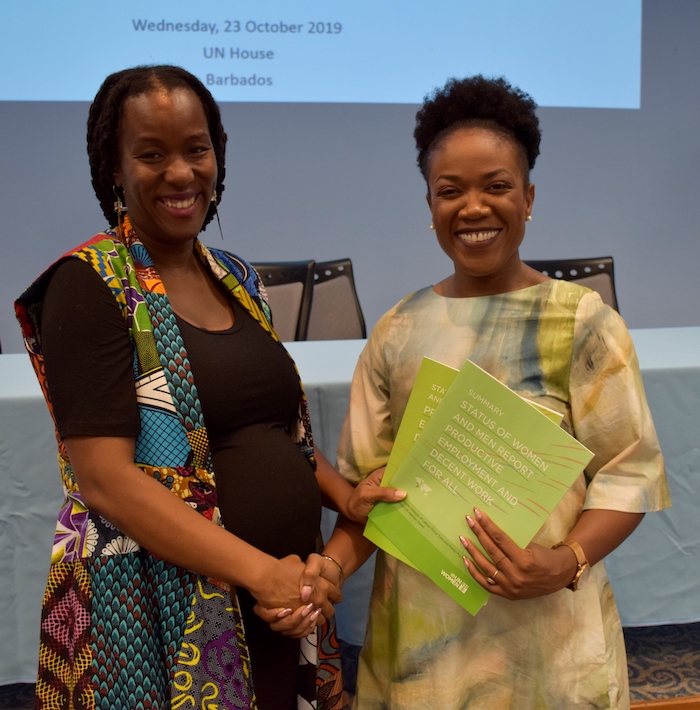Women in CARICOM are not experiencing their right to decent work to the same extent as men
UN Women MCO Caribbean launches its Status of Women and Men Report: Productive Employment and Decent Work for AllDate:

UN Women MCO Caribbean Deputy Representative Tonni Brodber and the Honourable Marsha Caddle, Minister in the Ministry of Economic Affairs and Investment
Unpaid care work is one of the main reasons, women remain outside of the labour force and their lower levels of economic activity. Also, despite significant achievements in education, structural barriers to gender equality and women’s empowerment persist in the labour market.
UN Women recently launched its Status of Women and Men Report: Productive Employment and Decent Work for All. The Report provides a Gender Analysis of Labour Force Data and Policy Frameworks in Six CARICOM Member States - Barbados, Grenada, Guyana, Jamaica, St. Lucia and Trinidad and Tobago.
The launch in Barbados chaired by the UN Women MCO Caribbean Deputy Representative Tonni Brodber and under the auspices of the Honourable Marsha Caddle, Minister in the Ministry of Economic Affairs and Investment, also included a detailed presentation of the findings by UN Women Programme Specialist for Economic Empowerment and Statistics, Isiuwa Iyahen, who co-authored the report along with Deborah Budlender, Social Policy Expert and Statistician.
Read the Deputy Representative’s Remarks to the Report Launch >>
For women and men to benefit equitably from economic growth, there must be recognition of their respective vulnerabilities and disparities and robust evidence-based policies put in place to reduce and eradicate the inequalities. This report contributes to these efforts by providing analysis and discussion – from a gender perspective – of the more common labour force indicators, alongside analysis and discussion of some additional indicators. Most official reports based on analysis of Labour Force Survey (LFS) data is disaggregated by sex. However, the gender differences are not always discussed.
The LFS focuses on “economic” work – that is, work for pay, profit or gain but they do not ask explicitly about unpaid care work. They do not ask about work such as cooking, cleaning and other housework, or caring on an unpaid basis for members of one’s household and community. However, this report highlights some of the ways unpaid care work impacts on women’s and men’s “economic” work.
- These types of work, i.e. unpaid care work, provide important services that contribute to the well-being of the population and also ensure workers are available and able to work well in the economy.
In an examination of the occupational profile across the six countries, there are strong similarities. Gender-based stereotyping has resulted in occupational segregation with women more likely to work in the care economy paid and unpaid, and service-oriented and clerical positions than men. Women also account for well over half of all jobs in the professional and services and sales work categories. The two occupations in which women are least well represented are craft and related trade workers and plant and machine operators.
The report also highlights:
- The female hourly rate is less than 100% of the male rate in all countries except in Barbados (where the rates are the same) and Jamaica. Women’s earnings, once disaggregated by educational level, are lower than those of men in all countries, including Barbados and Jamaica, revealing that women do not receive the same reward for education that men do.
- Gender pay gaps, although not as wide as in previous years, have proven resistant to equal pay legislation.
- Women are more likely than men to have tertiary education. However, the employment rate is lower for women than men at each of the three levels of education. The gender difference in this respect tends to be smaller for those with tertiary education than for those with only primary education.
- Those who stay longer in the education system are likely to begin doing economic work later, but – once employed – one would expect them to have better jobs with higher earnings….
- Given that, as noted above, women tend to be more highly educated than men in these six countries, the lower employment rates for women suggest the economy is not taking full advantage of the available human resources. Conversely, many women are not reaping the full potential benefit of their education
- Women are many times more likely than men to live in households that contain no other adults but do contain at least one child under 18 – that is, there is a predominance of single-female-headed households with children.
- Across all countries examined, women perform more than their fair share of this work. Unpaid care work is thus a gender issue.
- Because unpaid work leaves fewer of the 24 hours in a day available, and because there is limited flexibility in the time at which some unpaid care tasks – especially those related to care of children – must be done, responsibility for unpaid care work is likely to place constraints on how women engage in “economic” work.
REPORT HIGHLIGHTS – PRESENTATION >>
What this tells us is that Access to education alone will not address the gender inequalities in employment. What is required is multifaceted. These structural challenges that remain can be addressed in large measure through policies to enable women’s equitable participation in the labour force. Measures that will decrease unpaid care work, such as subsidized childcare, parental leave and flexibility in work arrangements.
Despite legislation on equal pay for equal work, gender wage differentials persist in favour of men. The lack of sexual harassment legislation also renders women more vulnerable to exploitation in the workplace, hindering their productivity and employment prospects.
There needs to be the full understanding of the structural barriers to women’s empowerment in order for both women and men to enjoy, de facto, the full range of their rights. When women remain disadvantaged, a society continues to undervalue the full potential of all its people.